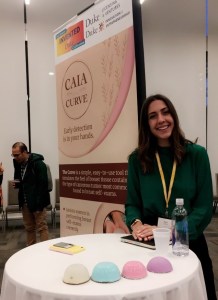
Breast cancer is the second leading cause of death for women in the United States. But if it’s caught early, the chance of survival is actually very high, versus 22% if it isn’t caught until Stage Four. Performing self-examinations regularly is one of the best ways for women to catch breast cancer early, yet very few women actually do them.
Why do so many women not perform self-exams despite the fact that doing so may save their life? Many simply just do not know what to do or what they are looking for. That is why Duke senior Beryl Baldwin founded Caia, a startup that makes a small handheld medical tool called the “Curve” that simulates what a tumor feels like so women can perform self-exams more accurately, easily, and confidently.
“You feel the tissue on the tool and then can compare it to what you’re feeling,” Baldwin said. “It’s meant to teach you not only what a tumor feels like but how deeply you have to press into breast tissue to identify the tumor, which can be really small and tricky to find. They can be overlooked easily.”
Because the Curve is meant to accurately simulate what feeling a breast tumor is like, Baldwin worked with doctors during the product design phase to make sure the feeling and size of the tumor was accurate. It will be made of silicon rubber, because that most closely resembles the texture of breast tissue, she said.
Baldwin, a recipient of a MICRO grant from NC IDEA, is currently iterating through prototypes and hopes to officially launch the product by September. She has long had the idea for Caia—named after the Roman goddess of women, healing, and hearth—but it wasn’t until she started taking classes in Duke’s Innovation and Entrepreneurship Program a few years ago that she officially got the ball rolling.

Baldwin will graduate Duke this summer and plans to work on Caia full time. She said she is currently seeking a co-founder.
The Curve will be sold on the Caia website that is coming soon, as well as other ecommerce sites like Amazon, Baldwin said. It is also her vision for gynecologists to hand them out at the end of appointments, like how dentists hand out toothbrushes.
But Baldwin doesn’t want women to only think about using the product when they are worried about their risk, because the reality is, a breast cancer diagnosis can happen to anyone, at any time. Nearly 85% of cases occur in women with no family history of breast cancer, and 5% of cases occur in women under 40 years old.
While mammograms are recommended once a women turns 35, there isn’t a strict protocol for what women under 35 are advised to do, Baldwin said. The National Cancer Association used to recommend women perform monthly self-exams, but stopped that due to the high rate of anxiety that many women experienced.
However, many of the gynecologists Baldwin spoke to said they disagree with the change in guidance. Cancer is a far higher price to pay than anxiety, Baldwin said, and if women were simply more equipped and knowledgeable about self-exams, the rate of anxiety would be much lower, she said.
Despite advances in chemotherapy and surgery, breast cancer mortality rates have remained stubbornly steady for women under the age of 50 since 2007 (they have decreased for women over 50 years old), Baldwin said. Evidence suggests that the best way to increase chance of survival is early detection. Only 40% of diagnoses are detected by women who found a lump during a self-exam, a percentage that Baldwin said could be a lot higher if more women knew how to properly perform a self-exam.
“A lot of women don’t really know what they’re looking for or feel confused or like they’re not equipped or capable of performing a self-exam accurately,” Baldwin said. “I wanted to change that by making a tool that women could use that would make it a lot more straightforward.”
Baldwin wants to normalize the entire conversation around breast cancer and self-exams. By selling the product through retailers where women commonly shop for themselves—like Sephora and Nordstrom—Baldwin hopes for women to view the product more as a wellness object and self-care tool rather than a scary medical device.
“I think it’s really crucial to educate people and normalize behaviors like this,” Baldwin said, “because performing self-exams regularly could truly be the difference between surviving your cancer diagnosis and not surviving.”
